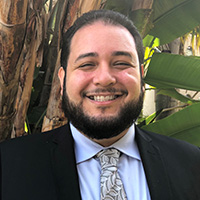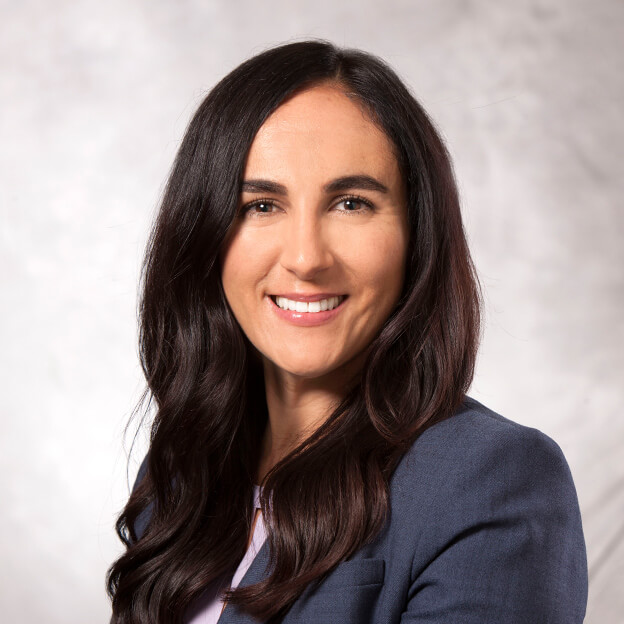
By Elijah T. Gaglio
Aguirre & Severson LLP
 Maggie E. Schroedter, partner at Higgs, Fletcher & Mack and incoming San Diego Lawyers Club president, grew up in Florida and graduated from the University of Florida with her bachelor’s degree in economics. She traveled to Sydney, Australia, for a semester during college where she worked with a manager who asked her if she ever considered going to law school because she had a “very analytical mind.” When she returned, she took a couple of legal writing courses and decided to apply to law school. She did not yet know whether she wanted to be a traditional litigator, but Schroedter knew law school would open doors and allow her to do what she wanted in life. In 2009, she graduated from Boston University School of Law and earned a Juris Doctor Degree.
Maggie E. Schroedter, partner at Higgs, Fletcher & Mack and incoming San Diego Lawyers Club president, grew up in Florida and graduated from the University of Florida with her bachelor’s degree in economics. She traveled to Sydney, Australia, for a semester during college where she worked with a manager who asked her if she ever considered going to law school because she had a “very analytical mind.” When she returned, she took a couple of legal writing courses and decided to apply to law school. She did not yet know whether she wanted to be a traditional litigator, but Schroedter knew law school would open doors and allow her to do what she wanted in life. In 2009, she graduated from Boston University School of Law and earned a Juris Doctor Degree.
Like many law school graduates from 2008 to 2009, Schroedter entered a historically depressed legal job market and recession in the United States (here’s a law review article about the legal job market during this time generally). She used this as an opportunity to learn Italian and obtain an internship in Milan, Italy, where she worked with families who transferred to work with the government and various municipalities.

From there, she made a bold decision to start her legal career and bought a one-way ticket to San Diego, California. She remembers not having any specific job offers and “not knowing anybody at all in San Diego.” To try to find job opportunities, Schroedter searched online for local lawyer events and ended up becoming connected with Lawyers Club of San Diego, an organization dedicated to advancing the status of women in the law and society. Schroedter was invited to attend a Lawyers Club committee meeting and she seized the opportunity. She eventually became a co-chair of several Lawyers Club committees and served on the Board of Directors over the following years. Recently, Schroedter was named the incoming president of Lawyers Club starting in July. She says her involvement with Lawyers Club has helped her build her professional network and find life-long friends.
Alongside her Lawyers Club involvement, Schroedter has been a litigator with Higgs Fletcher & Mack for the past ten years and was promoted to partner two years ago. She advises that new attorneys should start developing their reputation from day one, “You want to develop your reputation in the law firm, you want to be known as the person who is a great writer and can be trusted to handle cases with minimal oversight. Become an expert in your field or whatever is required for litigation.”
Those interested in being promoted to partner should start obtaining their own clients and figuring out their clients’ needs, for every firm looks at how you are handling your book of business and cases from start to finish. Schroedter also recommends promoting yourself in the community and to your clients because they will make great referral sources.
A significant part of Schroedter’s practice involves commercial litigation and bankruptcy, with a special emphasis on bankruptcy appeals. Schroedter tries to always have sensitivity and empathy when talking with clients, particularly those who are filing for bankruptcy.
Although Schroedter did not initially contemplate practicing bankruptcy law, she became more interested in the business side of cases within a couple of years of her practice. Her transition to bankruptcy law happened organically when Paul J. Leeds, a partner at her firm, asked for help on a case. She fondly remembers working with him on the case and really enjoying bankruptcy law. Schroedter analogizes the United States Bankruptcy Code to an intricate puzzle and appreciates the inchoate issues in bankruptcy law. From there, she continued to work with Leeds and began handling both creditor and debtor litigation. She found her new bankruptcy experience to be complementary to her existing practice of commercial litigation.
One area many new lawyers struggle with is timekeeping and billing clients. Schroedter says that attorneys billing practice may depend on the case. For example, when representing a debtor filing for bankruptcy under Chapter 11 of the Bankruptcy Code, attorneys’ fees must be approved by the bankruptcy court. As a result, for debtor cases, Schroedter must balance billing-requirement compliance and protection of confidential attorney-client information.
Schroedter also emphasizes that different clients may have different requirements for the format and detail-specificity of billing entries. She advises attorneys to generally be as specific as possible and inform clients exactly what work was done to move the case forward. Attorneys should ask themselves: “How is what you are doing important to the client’s bottom line or effective to the case?” Successful outcomes should be emphasized wherever possible; instead of billing a client for “attending a motion to dismiss hearing,” an attorney should bill for “attending a hearing where the court granted the client’s motion to dismiss.”
Schroedter also stresses the importance of networking and advises law students and new attorneys to not be intimidated to network even if you do not know anyone at the event. Given the pandemic, law students and attorneys should welcome the many different ways for attorneys to connect virtually. She adds that there is some benefit to having events virtually, especially for those who cannot make it to downtown San Diego for lunch in the middle of the day. Schroedter encourages attorneys to embrace the virtual events and not take a step back from connecting with other attorneys. For a list of upcoming virtual events to connect to other legal professionals at the San Diego County Bar Association, click here.